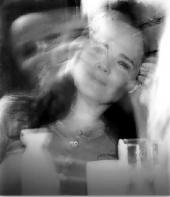Sarah Maclay

Sarah Maclay is the author of Music for the Black Room, The White Bride and Whore (all, University of Tampa Press). Her poems and criticism have appeared in APR, Ploughshares, FIELD, The Writer's Chronicle, Poetry Daily, VerseDaily, The Laurel Review, The Offending Adam, The Best American Erotic Poems: 1800 to the Present, Poetry International, where she serves as Book Review Editor, and elsewhere. The recipient of a Special Mention in Pushcart Prize XXXI, a 2009 Grisham fellowship, and the Tampa Review Prize for Poetry, she teaches at Loyola Marymount University and conducts workshops at The Ruskin Art Club and Beyond Baroque.
26
—as, after Odysseus, her body wanted to be Ophelia
The pistol came with its own music.
An echo slid from her throat:
Liquid, alive beyond common names for color.
How at night she could not swim.
Her song like a line of neon in wavering slices
across the crinoline dark
until the dogs began to bay
and men slipped into the skins of animals
to roll against the mud without the barrier of clothes.
How that bay was a living jewel—the sound, the topaz water—
the water had poured from her
and become alive.
She would wash up on the shore or float,
as white as the lizard who pulls the carriage
in a dream, all soggy finery
and hair and reeds.
Over and over
her body was painted
in darkness,
like a wine of skin.
What was true:
It was up to her to invent
her own music,
as she began to hear it
in the growing stain of sky.
32
Because identity had gone
And no one was waiting
(There was no garden, no stair,
There was no snow)—
Someone, for instance,
Would not be able to hear
Callas whisper
All the familiar objects
Had been removed
There was the sound of traffic—
But in the morning of a foreign city
Under the upturned corners
Of the mouth
What was there
When the muscles went
Why would no one
Speak about it
It was not a dilemma
But a state
Air was moving
Through the scarves of women
Seen from the bus—
Through cypress,
Eucalyptus
People held their clothing on,
Tightly
It was hard to know
What to hear
Was a film already empty
The script had been written
The sound of birds
Infiltrated me
A huge, swaying texture
Like Beethoven
Soaring out of the Schonbrunn
A moving curtain surrounding the windows
In and out of sleep
Walking silently through trees
43
—Mystery Box
What you cannot see is the black river,
how the horizon merges into sand, the sky goes granular—
and what might have begun as clouds,
hills.
Someone has the idea of an oarsman,
standing on a wooden raft,
ferrying a lounging man
and a shape, ambiguous—
from this angle, it looks like a dead horse
or a folded robe.
And the oar no bigger, really, than a needle,
dips into the idea of black, the water scored
like an old LP.
Someone has taken spring away,
and summer,
and water.
You cannot see the ants as they come at your
bare, bloody feet.
You look up
into the endless sand of sky.
There is no sky.

